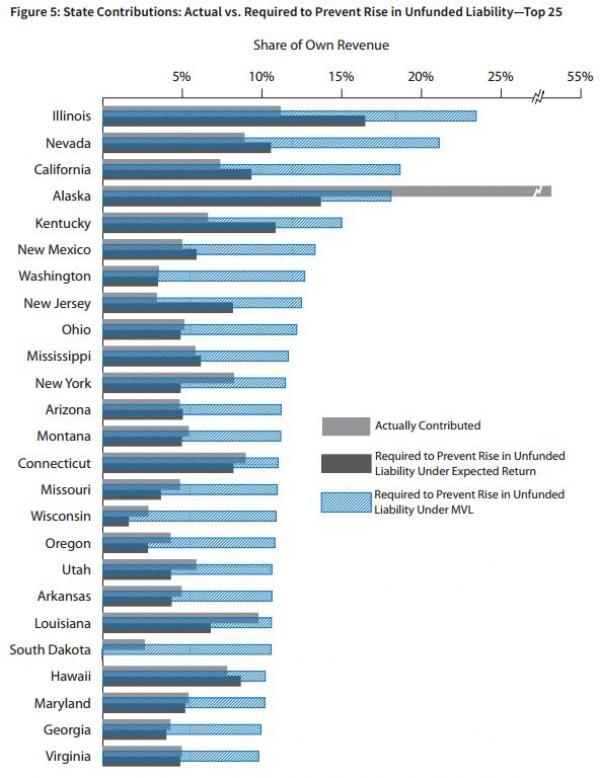1.Chart to Watch in 2017…European Financials.
EUFN Euro Financials ETF—Recovered all of 2016 DB panic, back to 2015 highs.

10 year…IYF Ishares U.S. financials ETF +82% vs. EUFN -2%

www.yahoofinance.com
2.The Entire Outperformance of U.S. vs. Europe for the Last 47 Years Occurred in Last 7 Years
Ritholtz Wealth Michael Batnick
Michael Batnick, our Director of Research, put a note out to our wealth management clients last week that gets into some of the reasons why investors are underweight Europe and why we think they’re all about to miss out on a period of good performance. Please understand that when I share things like this, it is for information purposes only and nothing you read on this site should be considered as advice or a solicitation to buy or sell any security…
Below, I excerpt a small part of what Michael had to say:
U.S. investors could look at past performance, even long-term performance, and conclude that there is no point investing in European equities. One dollar invested in MSCI Europe (USD) in 1970 is now worth $56. One dollar in the S&P 500 over the same period would have grown to $106 today. Yet on closer examination, this is a perfect example of statistics reporting the facts but hiding the truth. Thanks to the power of compounding, performance over the last few years has had a huge effect on long-term returns. From 1970 to 2009, the S&P 500 compounded at 9.87%, and MSCI Europe at 9.88%. The entire outperformance of the last 47 years occurred during the last seven years.
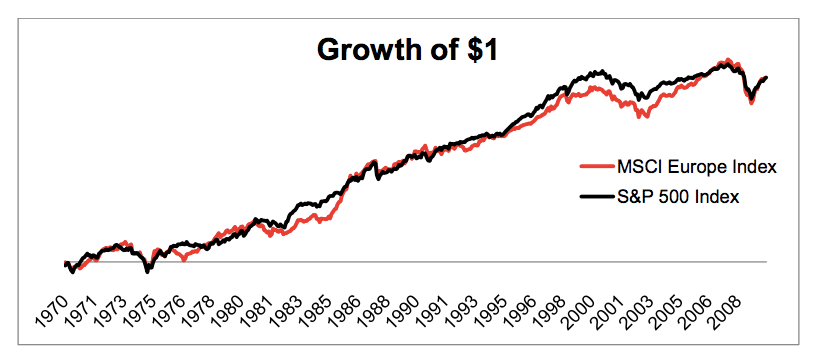
That underperformance, combined with investors’ attitudes toward European stocks — which are apathetic at best — has caused the valuation gap between U.S. and European equities to widen into a gulf. The cyclically adjusted price-to-earnings ratio, or CAPE, measures the price to real earnings over the last ten years. The ratio for the United States is 30 and for European equities it’s just 17.
3.Greece Outperforming Developed Europe YTD…+21% vs. +15%
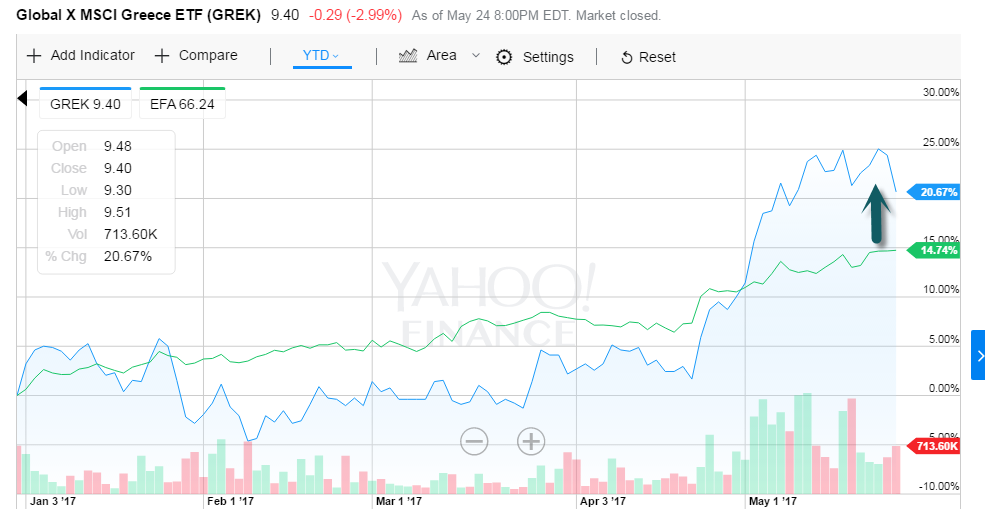
www.yahoofinance.com
4.Comparing Bull Markets.
Chart of the Day
With the S&P 500 trading near record high territory, today’s chart provides some perspective on the current rally by plotting all major S&P 500 rallies of the last 86 years. With the S&P 500 up 118% since its October 2011 lows (the 2011 correction resulted in a significant 19.4% decline), the current rally is above average in magnitude and the second longest rally since the Great Depression.
Notes:
– A major stock market rally has been defined as a S&P 500 gain of 30% or more (following a correction of at least 15%).
– The S&P 500 was not adjusted for inflation or dividends.
– Selected rallies were labeled with the year in which they began.
– There are 252 trading days in a year (100 trading days equal about 4.8 calendar months).

5.Pensions Underfunding….Student Loans and Car Loans Look Paltry in Comparison
As part of the study, Rauh reviewed, in detail, 649 state, county and local pension systems in the United States and ranked them based on funding status and impact on local budgets. What he found was a hidden taxpayer debt burden, in the form of underfunded pensions liabilities, totaling over $3.8 trillion. Of course, as we’ve pointed out multiple times as well (see “An Unsolvable Math Problem: Public Pensions Are Underfunded By As Much As $8 Trillion”), Rauh argues that that $3.8 trillion taxpayer obligation is actually much larger if you apply some “common sense” math as opposed to “pension math.”
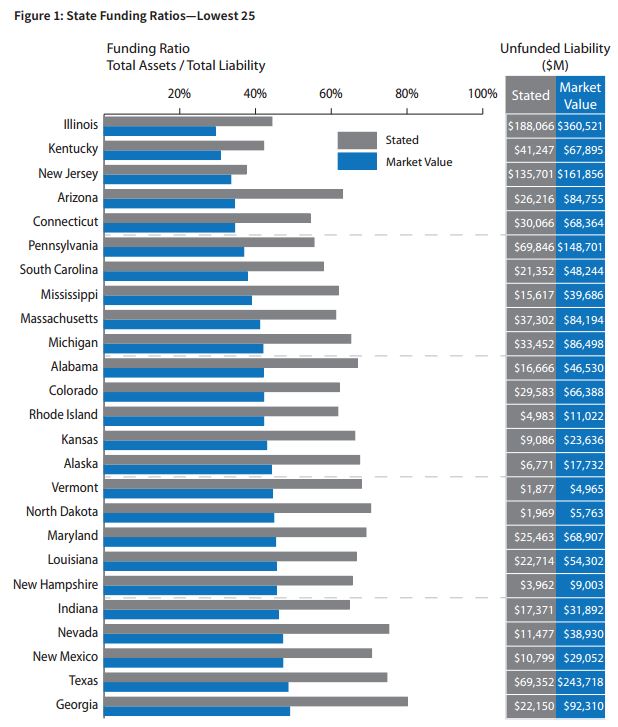
Meanwhile, the worst funded state pensions will continue to see their underfunded liabilities continue to grow as they would have to dedicate anywhere from 15%-25% of their entire revenue base just to maintain their current funding levels…which, of course, is not likely.
6.Median Household Income Return to Highs…More Good News for Housing.
The United States: Inflation-adjusted household incomes rose to the highest level since Bill Clinton was president.
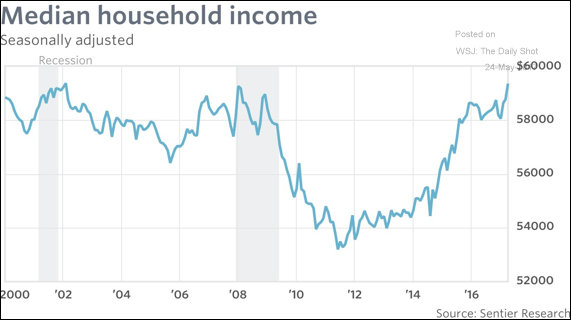
Source: MarketWatch; Read full article
www.thedailyshot.com
7.Read of the Day….Venture Fund Investments up 37% Y over Y..Private Money Crowding Out IPOs.
Venture Funds Flood Startups With Cash
Investments in first quarter rose 37% from the previous period, to $14.5 billion
By
Scott Martin
Investors injected $14.5 billion into U.S. venture-backed startups in the first quarter, up 37% from the previous period, according to data from Dow Jones VentureSource.
Recipients of venture funding included financial services, which saw a 15% bump in investment to $913.1 million, compared with the $792.4 billion raised in the prior quarter. Fintech startup Social Finance Inc. hauled in a big chunk of that in the latest round, raising $500 million in the period.
After a cooling period the past year, information-technology investment edged higher, hitting $3.05 billion in the quarter, up 13% from the $2.7 billion in the prior period. A slice of that, investments in software, returned to favor as well, as investors put to work $2.14 billion, up about 13% from the $1.9 billion unlocked in the previous quarter.
Investors in consumer services put in $2.07 billion for the quarter, a nearly 17% decline from the $2.48 billion in the previous period, amid concerns over sky-high valuations in the sector.
Despite those worries, food-delivery upstart Instacart Inc. raised $400 million in the period.
Health-care investors returned in earnest in the period. Venture stakes rose to $4.86 billion, up 98% from the $2.45 billion turned loose in the fourth quarter, as startups such as Grail Inc., which is developing cancer tests, attracted $914 million, the largest deal in the period.
Write to Scott Martin at Scott.Martin@wsj.com
https://www.wsj.com/articles/venture-funds-flood-startups-with-cash-1495661572?tesla=y
8.My Best Advice for Graduates: 12 Tips for a Happy Life
What useful advice did you receive, when you were graduating?
Posted May 24, 2017
Source: University Leicester, flickr
It’s graduation season.
I’m particularly aware of this, because my daughter Eliza is graduating from high school in two weeks. The days are long, but the years are short.
I’m trying to hold back the urge to follow her around the apartment giving her little bits of advice and wisdom. To relieve my mind, here’s what I would tell her, or anyone graduating from high school, college, or graduate school:
1. Know yourself
Something that’s clearer to me every day is that there’s no magic, one-size-fits-all solution for building a happy, healthy, and productive life. You have to know yourself: your temperament, your interests, your values. For instance…
The better we know ourselves, the more readily we can construct a life that will work for us.
2. Beware of drift.
“Drift” is the decision we make by not deciding, or by making a decision that unleashes consequences for which we don’t take responsibility.
You go to medical school because both your parents are doctors. You get married because all your friends are getting married. You take a job because someone offers you that job. You want the respect of the people around you, or you want to avoid a fight or a bout of insecurity, or you don’t know what else to do, so you take the path of least resistance.
The word “drift” has overtones of laziness or ease. Not true! Drift is often disguised by a huge amount of effort and perseverance. For me, law school was drift, and it was hard every step of the way, from the LSAT to my clerkship with Justice Sandra Day O’Connor to the New York Bar exam. In the end, I’m happy I did go to law school—and that’s another tricky thing about drift. Sometimes drift does make you happy. But don’t count on it.
One of my drift-related Secrets of Adulthood is “You can choose what you do, but you can’t choose what you like to do.” And here’s another one: “Approval from the people we admire is sweet, but it’s not enough to be the foundation of a happy life.”
article continues after advertisement
One of the problems of drift is that we try to deny we’re drifting. To see if you’re drifting, take this quiz.
3. Don’t let the perfect be the enemy of the good.
I cribbed this from Voltaire, and I remind myself of it often.
I can’t let the perfect, fantasy Gretchen crowd out the actual, real Gretchen.
I remind myself that the 20-minute walk I take is better than the 3-mile run I never start; having friends over for take-out is better than never having people to an elegant dinner party.
4. Write (and re-write) your own set of personal commandments.
One of the most challenging—and most helpful and fun—tasks that I did as part of my Happiness Project was to write my Twelve Personal Commandments. These aren’t specific resolutions, like “make my bed,” but the overarching principles by which I try to live my life.
I think this is a great exercise—to distill your core values and hopes for yourself into a succinct list, so that they’re very clearly in your mind. And then you can re-visit them periodically, so you can update them as you grow older and your life changes.
5. Identify the problem.
This idea seems so obvious, but it has been the one of my most important insights. Now I’ve disciplined myself to ask, “What’s bugging me? Why is something not working? What’s the problem here?”
A friend hated her law job so much that she was ready to quit. But when she “identified the problem,” she realized she actually hated her commute. She started listening to audio-books, and her life improved dramatically.
Usually there isn’t such an easy, dramatic solution, but nevertheless, it astonishes me how often it works.
I could never get myself to hang up my coat, and when I “identified the problem,” I realized that I didn’t like putting things on hangers. I added six hooks to our closet door—and problem solved.
6. Take care of your body: exercise regularly, get enough sleep.
I’ve done hundreds of happiness and habit interviews from successful, creative people. Almost all of them mention the importance of a regular exercise routine—and also that they wish they had started this habit sooner. They also frequently mention the importance of getting enough sleep.
Our physical experience always colors our emotional and intellectual experience. If we’re feeling exhausted or sluggish, it’s hard to be happy and productive. Get enough sleep, and get some exercise, and you’ll find it much easier to be happier, healthier, more productive, and more creative.
7. Don’t expect to be motivated by motivation.
I really dislike the word “motivation.” I try never to use it. And here’s why: People use the term to describe their desire for a particular outcome (“I’m really motivated to lose weight”) as well as their reasons for actually acting in a certain way (“I go to the gym because I’m motivated to exercise”). Desire and action are mixed up in a very confusing way.
article continues after advertisement
People often tell me, “Yes, I’m very motivated to achieve this aim,” but when I press, it turns out that while they passionately wish they could achieve an outcome, they aren’t doing anything about it. So what does it mean when they say they’re “motivated?” No idea.
In fact, people aren’t motivated by motivation.
Expert advice often focuses on motivation, by telling people that they just need more motivation to follow through. This may work in a certain way, for certain people (see below), but not for everyone.
The bad result of this advice is that some people spend a lot of time whipping themselves into a frenzy of thinking how much they want a certain outcome, as if desire will drive behavior. And it rarely does.
Instead of thinking about motivation, I argue that we should think about aims, and then take concrete, practical, realistic steps to take us closer to our aims.
Instead of thinking, “I want to lose weight so badly,” think instead about the concrete steps to take, “I’ll bring lunch from home,” “I won’t use the vending machine,” “I won’t eat fast food,” “I’ll quit sugar,” “I’ll cook dinner at home at least four nights a week,” “I’ll go to the farmer’s market on Saturdays, to load up on great produce.”
Of course, in my book Better Than Before, I argue that the great thing about habits is that you don’t need to feel “motivated!”
In my forthcoming book, The Four Tendencies, I do talk about how thinking about reasons for action can help some people to act, and how desire does help some people to act—but that’s not the same as motivation.
For Upholders and Questioners, thinking about reasons helps.
For Rebels, thinking about desire helps.
For Obligers, outer accountability is the crucial element. What does this mean? It means that Obligers are the least likely to be helped by thinking about “motivation.” And guess what? They’re the Tendency that talks most about motivation! They keep trying to amp up their motivation, and then they get frustrated because that doesn’t work. Nope. Obligers should focus on systems of outer accountability.
We really can’t expect to be motivated by motivation.
8. Give time and energy to keepingrelationships strong.
Ancient philosophers and modern scientists agree: the most essential key to happiness is strong relationships with other people.
We need enduring, intimate bonds; we need to feel like we belong; we need to be able to confide; we need to be able to get and give support.
Anything that tends to deepen or broaden relationships is likely to boost happiness. Things like:
· attending reunions
· going to weddings
· remembering birthdays
· keeping up a group chat with your friends who are spread across the world
· starting a book club
· making friends with the friends of your friends (this is called “triadic closure”)
· having a standing yearly date to get together — for a few years out of college, my friends all got together for an Ides of March weekend. Somehow, we stopped, and I’ve always regretted that. Along those lines…
· if someone’s important to you, make concrete plans to see them; remember, something that can happen at any time often happens at no time.
9. Ask yourself, “Whom do I envy?”
Envy is a very unpleasant emotion, and we often don’t even want to admit to ourselves that we’re feeling envious.
But negative emotions play a very important role in a happy life, because they warn us that something needs to change. When we envy someone, it’s a sign that that person has something that we wish we had for ourselves. And that’s useful to know.
When I was considering switching from law to writing, I noticed that when I read in my college magazine about people who had great law careers, I felt a mild interest; when I read about people who had great writing careers, I felt sick with envy. That was an important clue.
10. Remember, everyone makes mistakes.
Everyone makes mistakes; it’s inevitable. And if you’re not failing sometimes, you’re not trying hard enough.
11. Know your “tell.”
In gambling, a tell is a change in behavior that reveals your inner state. Gamblers look for tells as clues about whether other players are holding good or bad hands.
And it’s common for people to have a “tell” in everyday life, too.
For instance, my “tell” is that when I’m feeling anxious or worried, I re-read books aimed at a younger and younger audience. Under all circumstances, I love children’s literature, and read it often, but when I’m reading these books as an anxiety tell, I inevitably re-read instead of reading books I’ve never read before. I want the coziness, the familiarity, the high quality of a book that I know I love.
Self-knowledge is one of the greatest challenges for happiness and good habits. Why is it hard to know that I’m feeling anxious—don’t I feel it? Why is it so hard to know myself? It seems like nothing should be easier and more obvious than to know ourselves—but it’s not.
Recognizing and watching for your “tell” can help you manage yourself better.
12. Collect your own Secrets of Adulthood.
For years, I’ve been collecting my “Secrets of Adulthood,” which are the scraps of wisdom I’ve managed to grasp as I’ve become an adult. It’s fun—and helpful—to keep track of these.
What advice would you give to a graduate? Or what useful advice did you receive, when you were graduating?
https://www.psychologytoday.com/blog/the-happiness-project/201705/my-best-advice-graduates-12-tips-happy-life
